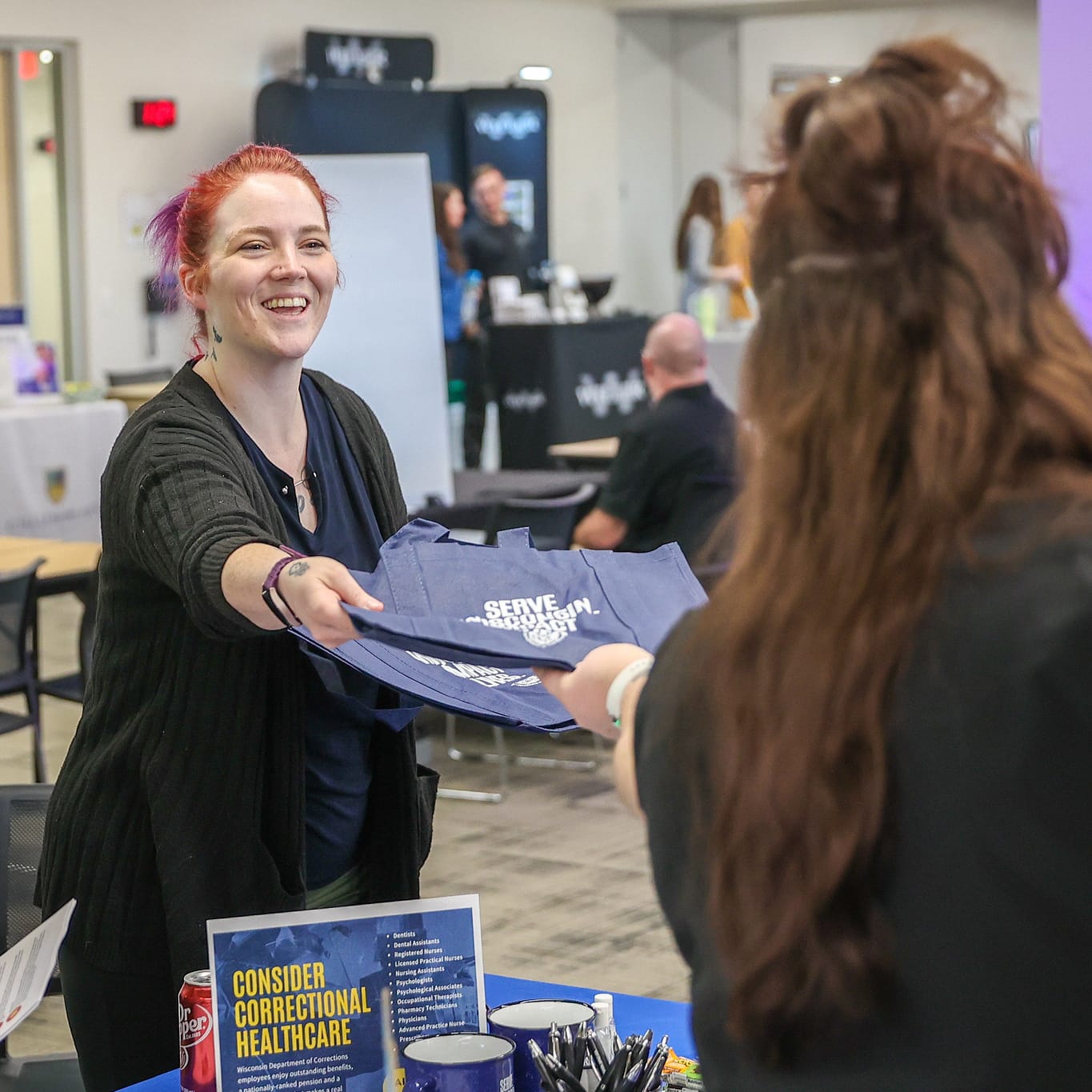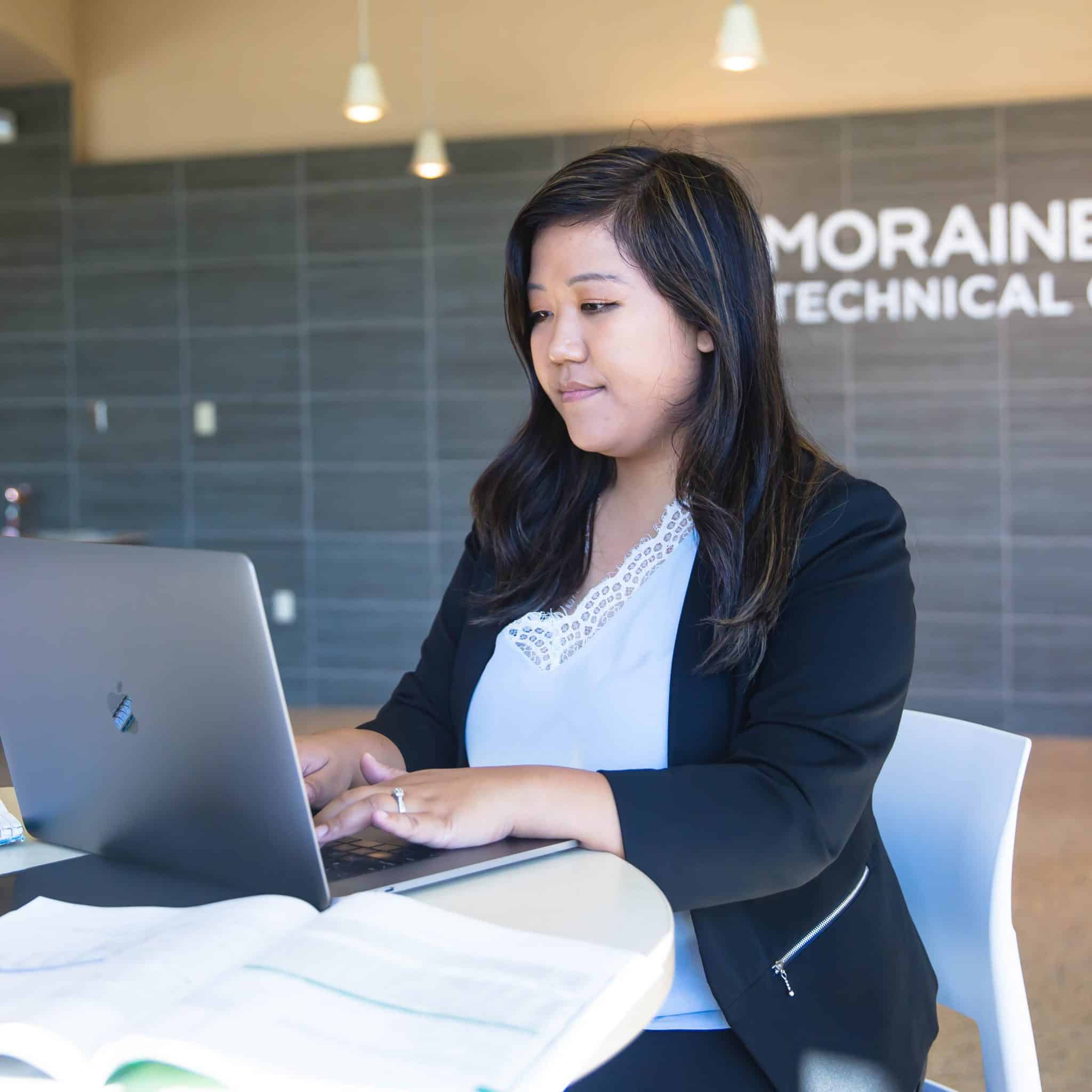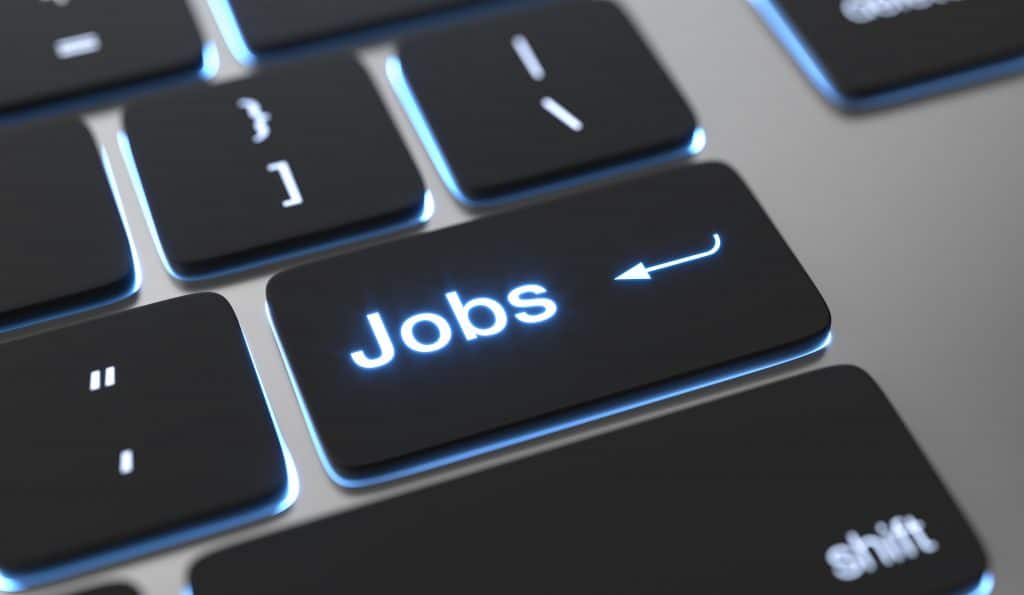Search strategy, a great resume, interview skills; finding a job is a job all by itself. Getting great advice means less stress!
Current Student and Alumni Resources
- Business environments – wear a suit or dress pants and a nice shirt or blouse.
- Technical or casual environments – wear khakis or dress pants with a nice shirt or blouse.
- Your appearance should be neat and clean, pressed, and polished.
- Take a shower, use deodorant, and brush your teeth.
- Make sure your hair is clean, neat, and professionally styled.
- Trim your nails. Leave nails unpolished, or use clear or neutral polish.
- Only wear subtle perfume, cologne, or aftershave. Your scent should leave the room when you do.
- Apparel should be clean, neatly pressed, and fit well. Stay clear of revealing clothing.
- Makeup and jewelry should be kept to a minimum.
- First impressions tend to be the lasting ones. When you make eye contact with a potential employer – you are being evaluated from the very beginning. Being properly prepared and “dressed for success” helps you make a favorable first impression.
Here is a list of suggestions for what you should bring to the Career Fair:
- Your Best Self: Get a good night of sleep, have a nutritious breakfast, practice your elevator speech, and present employers with the best version of yourself.
- Resume and References: Make sure you have plenty of high-quality copies. Some employers may ask for several copies and coffee incidences may happen at any moment.
- Work History: Prepare a detailed document highlighting your work history in case you need to fill out a job application. This includes contact information, employment dates, and names of supervisors. Always have a black or blue ink pen with you.
- Portfolio: Interview time is precious so have all relevant documents organized and ready to present in a professional folder before the interview starts. Use a neutral vinyl with a pocket and a paper pad to take notes.
- Bring extra copies of your resume. Prior to the fair, create your resume and also have it critiqued. Free resume reviews are available from Career and Employment Services.
- Take some time to research the kinds of jobs and organizations you would like to pursue. Survey the career fair program/guide and come up with a list of priority companies that you’d like to visit. Keep track of time so that you can talk to all of the organizations on your list.
- Dress and act as professional as possible. This will show your commitment to your future work life, and companies will take notice!
- Develop and practice a 30 second “elevator pitch.” Prepare what you will say when you meet a company representative and hand over your resume. Summarize your qualifications, and put emphasis on what you think is unique about you.
- Develop questions to ask the company. Ask about job duties and how you can expect to contribute. Do not ask about salary and benefit-related questions during your initial contact, and be sure to thank them for their time as well as get their business card.
- Follow-up your meeting with a thank you note, email or call. Call or email to inquire about what happens next if the procedure has not already been explained.
- What kind of entry-level positions (or internships) exist within your organization?
- Does your company hire on a continual basis or just at certain times of the year?
- How long does the hiring process take? What does it consist of?
- Are there opportunities for ongoing training through your organization?
- What kinds of skills and experiences do you look for in the employees you hire?
- What are the characteristics of your most successful employees?
- How much travel is involved?
- What made you choose this company and why do you stay?
Cover Letter
A cover letter is a unique way you can create an image of yourself. It will highlight the value, qualifications, and strengths you bring to the targeted or specific position. Students may obtain a cover letter review by contacting the Career and Employment Services Specialist.
Cover Letter Tips:
- Display professional, error-free writing.
- Use a variety of words including action verbs, descriptive adjectives, and adverbs.
- Demonstrate enthusiasm in the position and field of work.
- Tell your story in a concise way.
- Use top highlights from your resume that positively market your qualifications and skills in the field.
Cover Letter Examples:
• Cover Letter Example 1
• Cover Letter Example 2
• Job Search Handbook

Moraine Park – A Great Place To Work
Moraine Park Technical College strives to make a positive difference in the lives of students, staff and the larger community – building a comprehensive workforce in an accessible and caring learning environment. We offer great benefits for our employees in a team-based environment.
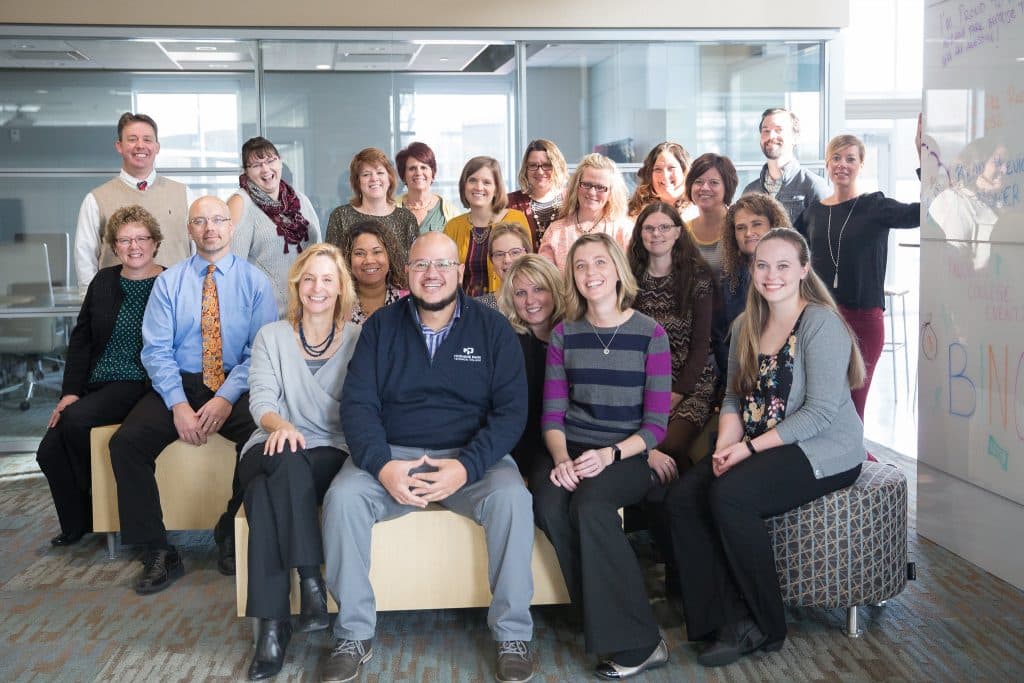

Handshake
Handshake is the largest early career network in the United States, helping millions of students from all backgrounds get hired and launch their careers with no connections, experience, or luck required. The Handshake community includes 18 million students and young alumni from 1,400 educational institutions including four-year colleges, community colleges, boot camps, and 290+ minority-serving institutions. Its platform connects up-and-coming talent across all 50 states with 650,000+ employers recruiting on Handshake—from every Fortune 500 company to thousands of small businesses, nonprofits, startups, and more.
Get hired on Handshake in four steps:
- Sign up and download the app.
- Create a profile and get personalized job recommendations.
- Meet with employers to learn more about company culture and open roles.
- Apply in as few as two clicks. Get the job.
Learn more at joinhandshake.com
If you’re a current student, login to Handshake below. If you’re an alumni, you will need to create an account to get started.
Internships
Internships are a valuable way to get practical work experience in your field of study. They can be paid or unpaid depending on the employer. Many times interns are hired on permanently after the experience concludes. Employers are open to working with the faculty to ensure college credit is given to students.
Moraine Park internships are directly coordinated through the academic department for your program area. Please reach out to your program instructor or academic advisor for more information.
Internship Resources:

Interviewing
Congratulations! Your cover letter and resume secured you an interview. Now it is time to go get that job!
The more you prepare for the job interview, the more confident you will appear before the employer. The following tips will help you get ready for the interview. The most common advice is to be honest and be yourself.
- Research the company and review the job description before the interview.
- Develop “prove-it” statements that will assist you with your responses. A “good story” that shows how you manage a customer conflict, solve a problem, work as a team, etc.
- Sell your qualifications rather than your need for a job.
- Practice answering interview questions.
- Prepare 3-5 questions to ask the interviewer.
- Dress professional; your appearance should be neat and clean.
- Be aware of your nonverbal communication. Eye contact, facial expressions, voice, body movements, and posture carry more impact than actual words spoken.
- Listen attentively; ask for clarification if you don’t understand something.
- Express enthusiasm and be polite to all the people you interact with.
- Send a thank you note afterwards.
- Test your technology before your meeting. Make sure you have a good internet signal, quality sound, and the software is compatible with your computer.
- Test your lighting. Make sure your face is clearly displayed on the screen.
- Create a visually appealing background; no clutter or inappropriate photos.
- Dress professionally; just as you would for an in-person meeting.
- Sit up straight and make sure to smile.
- Look directly into the webcam; not at yourself on the screen.
- Practice ahead of time. It is okay to have notes close by; just don’t read from a script.
- Find a quiet place in your home to participate in the interview; minimize distractions.
- If a child or pet interferes; acknowledge and apologize for the distraction, then move on.
- How would you describe a typical workday?
- Which job qualifications do you consider most important?
- What types of educational opportunities do you make available to employees?
- What are the opportunities for advancement or progression?
- What are your short and long-term goals?
- How would you describe the culture?
- How will I be measured or evaluated?
- How did this position become vacant?
- When do you plan to make a decision about this position?
- What is the best part about working here for you?
- Extra copies of your resume printed on quality resume paper.
- List of references printed on quality paper.
- Questions to ask the interviewer(s).
- A nice portfolio with a pen and pad of paper inside.
Networking
Networking is the action or process of making personal and professional connections. There are no straight lines in networking. Think of it as relationship building and maintaining.
Your career network should include anyone who can assist you with a job search or career move. Networking is the preferred way employers hire. It is cheaper than posting a job online and the employer receives higher quality job candidates.
Ways to Expand your Network:
• Career Fairs
• Company Tours
• Informational Interviewing
• Internships
• Job Shadowing
• Professional Organizations
• Student Clubs
• Volunteer Organizations


On Campus Recruitment
During On Campus Recruitment, employers visit one of our three campus locations to meet with students about open positions within their company. Employers will be set-up at a table near the cafeteria entrance between 11 am – 1 pm. Students may stop by the table to learn more about the employer and find out about their available internships/job openings. The employer may conduct interviews, so bringing a resume along is highly recommended.
Advantages of On Campus Recruitment:
- Career and Employment Services brings the employers to you.
- Career and Employment Services coordinates the entire event; you just need to stop in and chat with the employer.
- The event is offered during the lunch hour; not conflicting with your school schedule.
- Employers participating in on campus recruitments want to fill their positions with Moraine Park students.
Resume
The resume is a strategic marketing document with the purpose of moving an employer to invite you to interview. A well written resume will give the employer information allowing them to make that decision. It’s a formal, organized summary of your skills, education, and job-related experiences. Students may obtain a resume review by contacting the Career and Employment Services Specialist.
Resume Tips:
- Professional document, customized to fit a specific position.
- Easy-to-read and error-free.
- Use consistent headings and dates.
- Include a section on: header, skills or summary, education, and experience.
- Other relevant sections include: leadership, awards, and volunteer experience.
- Enhance with career field keywords.
- Keep to one page if possible, clearly organized by section.
- Save as a PDF for easy emailing/attaching.
- Print on one side of the sheet only; using quality resume paper.
Resume Examples:
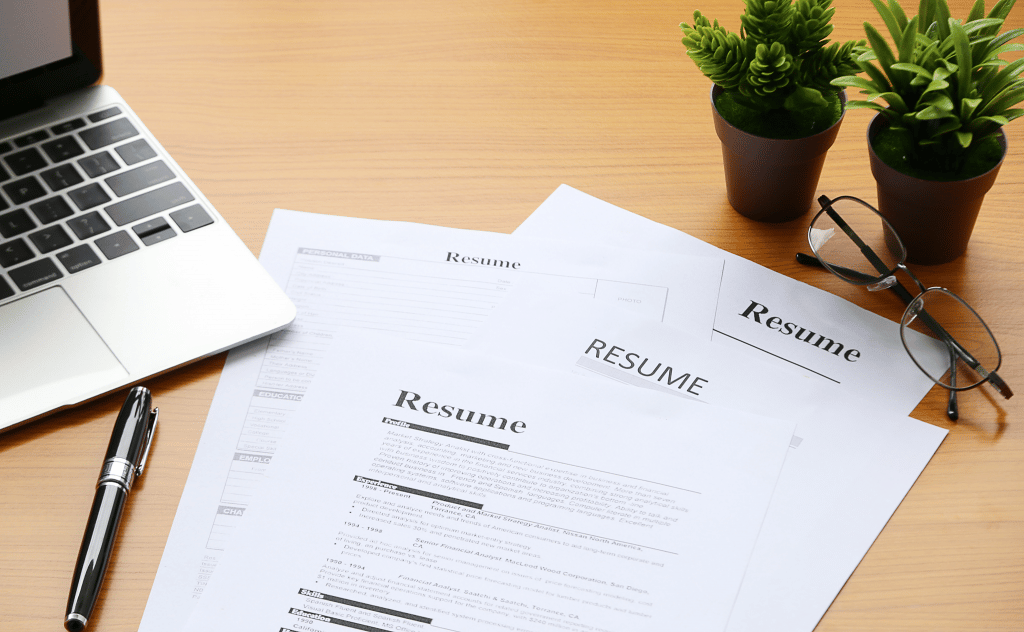

Salary Negotiation
Before you begin talking about pay or negotiating salary with a prospective employer, you need to find out how much the job is worth. Start by researching salaries so that you are prepared to get a job offer that’s reasonable.
Once you have done the research, how do you go about getting the job? Patience is the key. When interviewing for a new position, try your best not to bring up compensation until the employer makes you an offer. If you’re asked what your salary requirements are, say that they are based upon the position and the overall compensation package. Or you may tell the employer you would like to know more about the responsibilities and challenges of the job. Another option would be to give the employer a salary range based upon the research that you did up front. Once you receive an offer, take some time to think it over. Most offers include an expiration or respond by date. It is essential to respond back within this timeframe.
Salary Information
References
Preparing references may seem like a far less important task in your job search compared to networking, writing your resume, or interviewing. However, having good references is a crucial part of the job search process.
Reference Tips:
- Choose three to five references who can talk positively about your work quality, skills, and accomplishments. Use present or past co-workers or supervisors, instructors, co-members of volunteer activities, etc.
- Be sure to ask prospective references for permission to use them as a reference. Reconnect with them if an extended period of time has elapsed.
- Collect all contact information from each reference. Get the correct spelling of the references’ names, their phone numbers, and email addresses.
- Make sure the individuals you select to be your references are reliable. If even one of your references do not follow through (e.g. return a phone call or complete a reference survey), you may not move forward in the interview process.
- Do not list references on your resume; give only when requested.
- When it comes time for the interview, make sure to bring a separate reference page with you inside the portfolio.

BrightStar Care
November 26th
11:00 a.m. – 1:00 p.m.
West Bend Campus – Cafeteria Entrance
Eden Senior Care
December 4th
11:00 a.m. – 1:00 p.m.
Fond du Lac Campus – Cafeteria Entrance
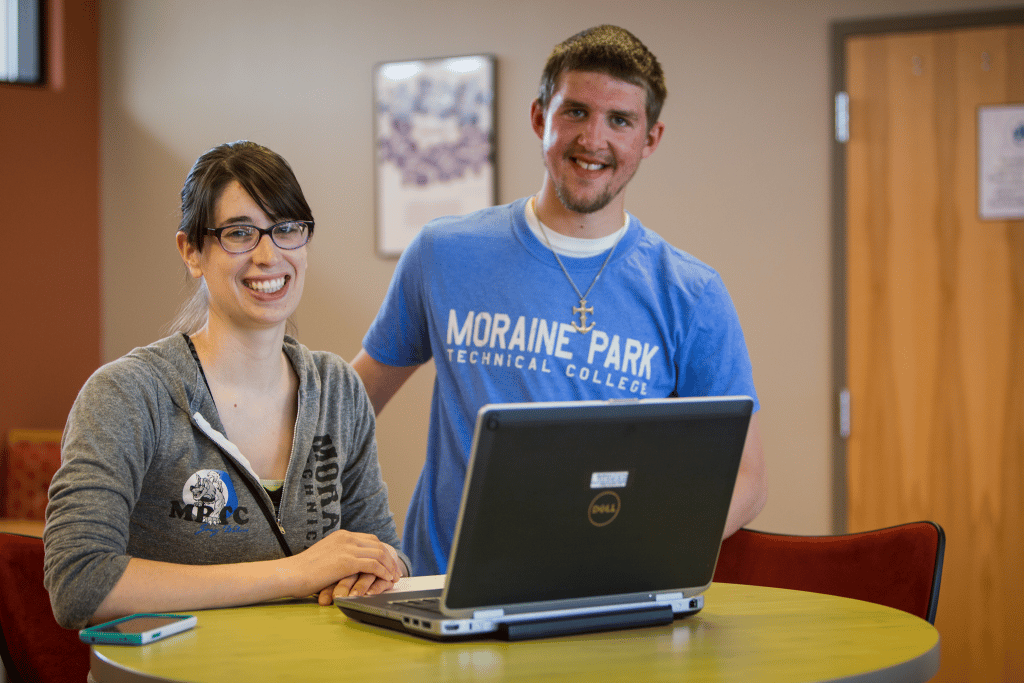
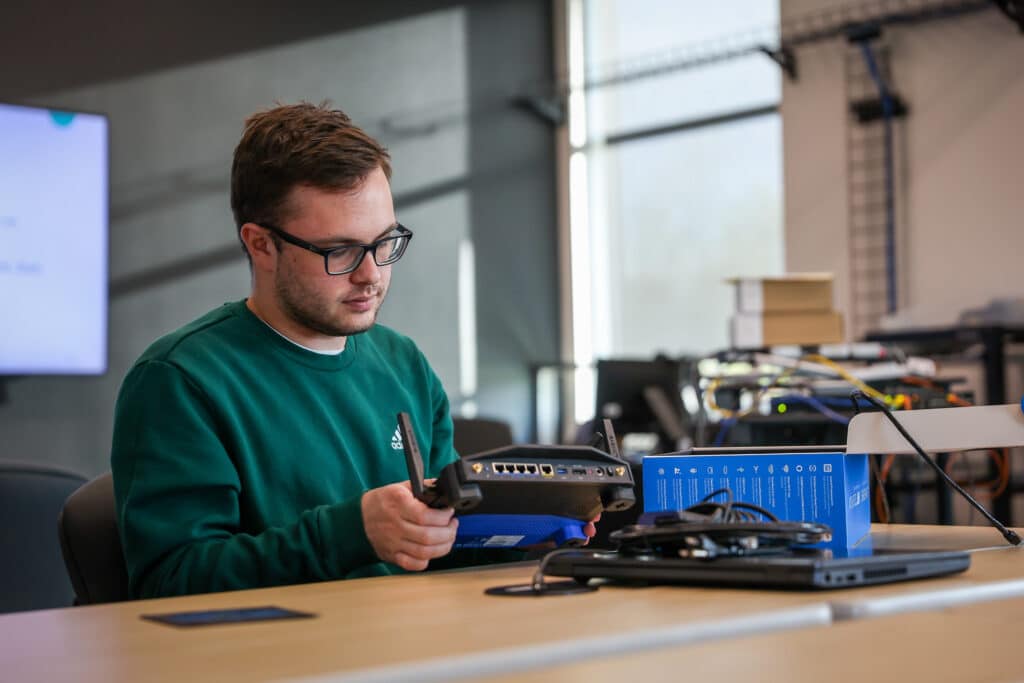


Need a Career Plan? We can help! Click below to explore your career options.
Contact Us

Michele Sabel
Fond du Lac Campus
Room: A-102.9
920-924-3205, TTY/VP: Use Relay/VRS
careerandemploymentservices@morainepark.ed



